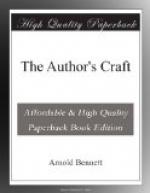The dramatist may have to imagine a landscape, a room,
or a gesture; but he has not got to write it—and
it is the writing which hastens death. If a dramatist
and a novelist set out to portray a clever woman,
they are almost equally matched, because each has
to make the creature say things and do things.
But if they set out to portray a charming woman, the
dramatist can recline in an easy chair and smoke while
the novelist is ruining temper, digestion and eyesight,
and spreading terror in his household by his moodiness
and unapproachability. The electric light burns
in the novelist’s study at three a.m.,—the
novelist is still endeavouring to convey by means
of words the extraordinary fascination that his heroine
could exercise over mankind by the mere act of walking
into a room; and he never has really succeeded and
never will. The dramatist writes curtly, “Enter
Millicent.” All are anxious to do the dramatist’s
job for him. Is the play being read at home—the
reader eagerly and with brilliant success puts his
imagination to work and completes a charming Millicent
after his own secret desires. (Whereas he would coldly
decline to add one touch to Millicent were she the
heroine of a novel.) Is the play being performed on
the stage—an experienced, conscientious,
and perhaps lovely actress will strive her hardest
to prove that the dramatist was right about Millicent’s
astounding fascination. And if she fails, nobody
will blame the dramatist; the dramatist will receive
naught but sympathy.
And there is still another region of superlative difficulty
which is narrowly circumscribed for the spoilt dramatist:
I mean the whole business of persuading the public
that the improbable is probable. Every work of
art is and must be crammed with improbabilities and
artifice; and the greater portion of the artifice
is employed in just this trickery of persuasion.
Only, the public of the dramatist needs far less persuading
than the public of the novelist. The novelist
announces that Millicent accepted the hand of the
wrong man, and in spite of all the novelist’s
corroborative and exegetical detail the insulted reader
declines to credit the statement and condemns the incident
as unconvincing. The dramatist decides that Millicent
must accept the hand of the wrong man, and there she
is on the stage in flesh and blood, veritably doing
it! Not easy for even the critical beholder to
maintain that Millicent could not and did not do such
a silly thing when he has actually with his eyes seen
her in the very act! The dramatist, as usual,
having done less, is more richly rewarded by results.
Of course it will be argued, as it has always been
argued, by those who have not written novels, that
it is precisely the “doing less”—the
leaving out—that constitutes the unique
and fearful difficulty of dramatic art. “The
skill to leave out”—lo! the master
faculty of the dramatist! But, in the first place,
I do not believe that, having regard to the relative




